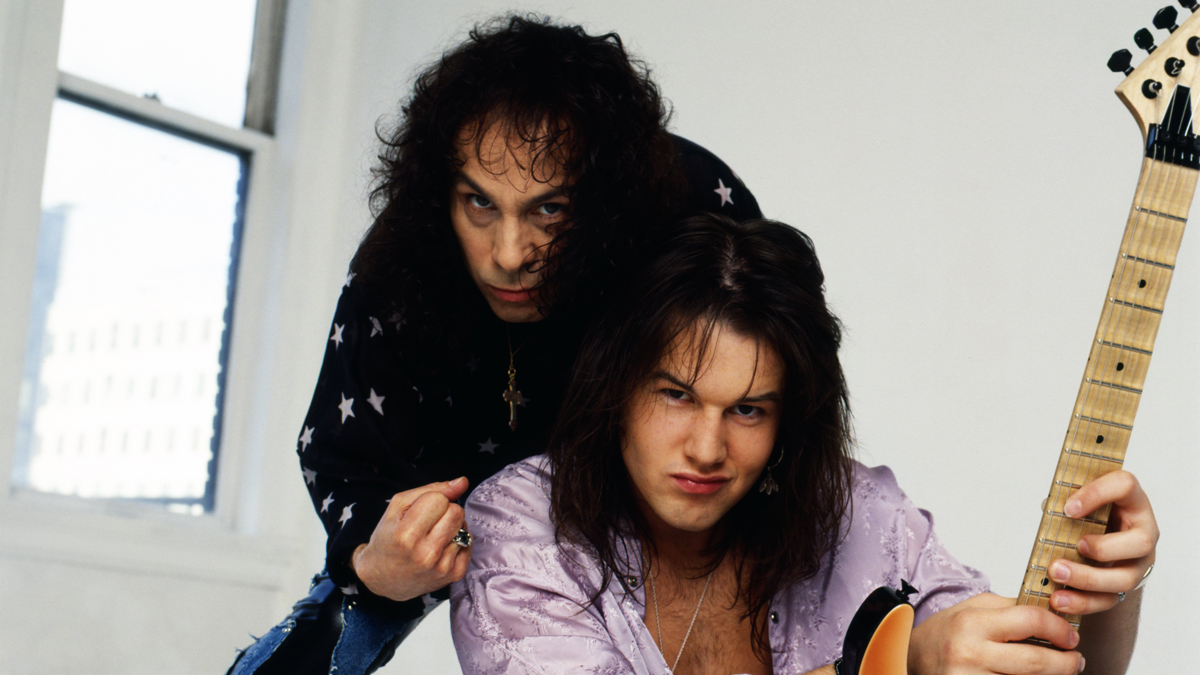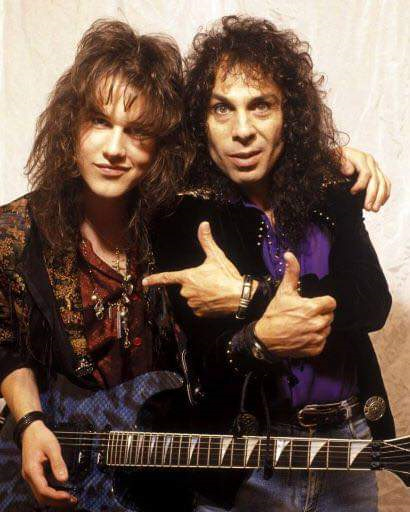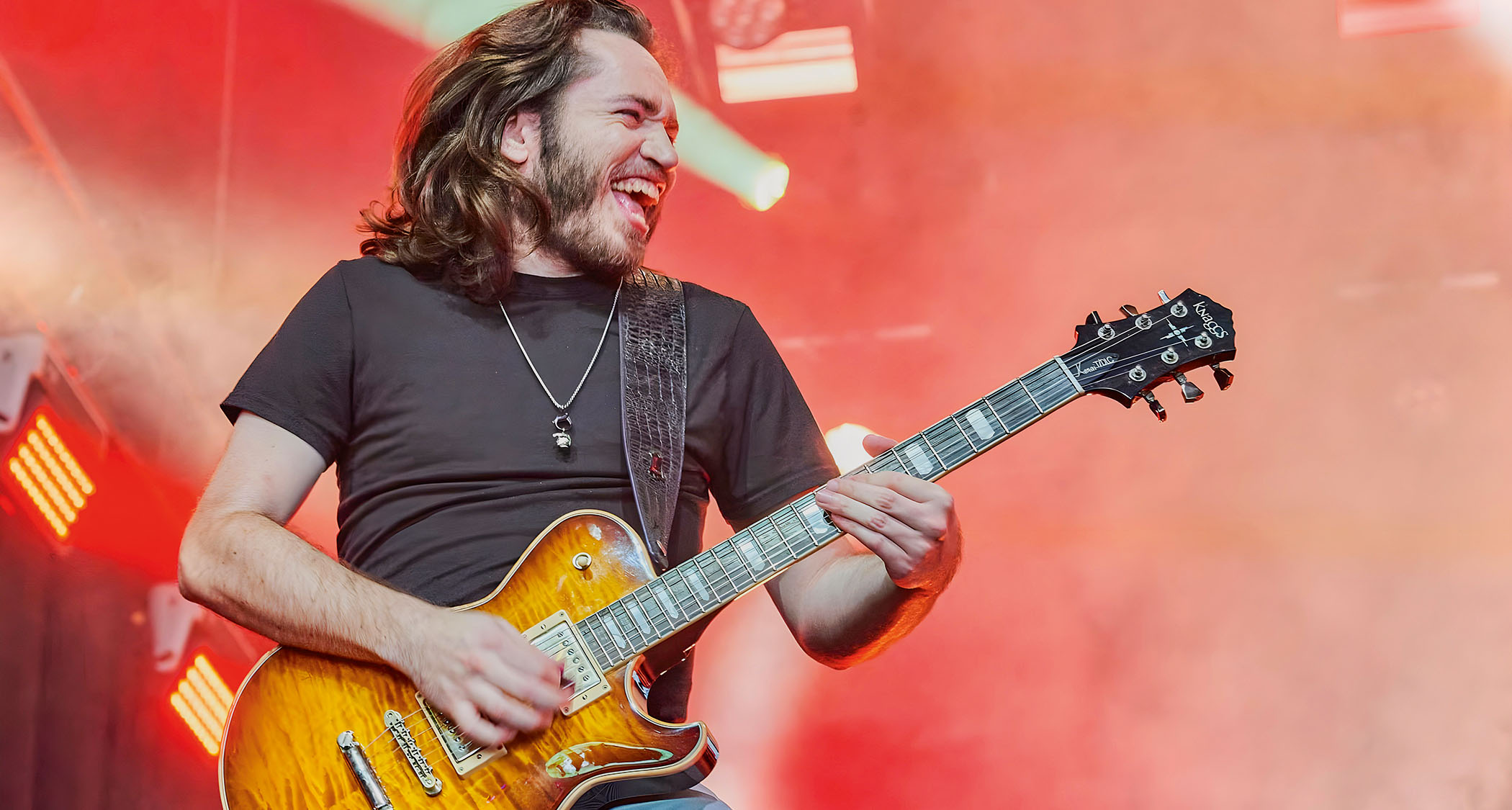Meet Rowan Robertson: Ronnie James Dio’s lost prodigy
How a virtually unknown 17-year-old shredder landed the coveted guitar slot with Dio – and went on to record the criminally underrated Lock Up the Wolves

All the latest guitar news, interviews, lessons, reviews, deals and more, direct to your inbox!
You are now subscribed
Your newsletter sign-up was successful
At some point, every young guitarist has listened to their favorite albums and indulged in a daydream about a walk-on gig with their heroes. It’s a universal fantasy, one that provides the inspirational fuel in most of our furnaces when we’re initially forging our identities as players and creatives.
For Rowan Robertson – who was a virtually unknown 17-year-old shredder in 1988 – those daydreams became reality when he landed the guitar slot in the legendary and tremendously influential metal act, Dio.
The story of Robertson’s entrance into the Dio fold is as astounding as it is inspiring. On the merits of a crude demo tape he recorded on a Tascam four-track in his bedroom and essentially cast into the wind, Robertson was delivered from playing pub gigs in his native England to replacing Craig Goldy in Dio, and was soon opening shows for Metallica – who were touring behind ...And Justice for All at the time.
But Roberston didn’t just land a tour with one of his favorite artists as a scab or a hired gun; the young guitarist went on to help write and record Dio’s criminally underrated fifth album, Lock Up the Wolves.
Lock Up the Wolves is something of an orphan record in the Dio discography. The album featured a completely new lineup for Dio, and it may have suffered among fans for it. However, the album did include some of the last material Ronnie James Dio penned with original band members: bassist Jimmy Bain, drummer Vinny Appice and longtime keyboardist Claude Schnell – all of whom left (or were dismissed) from the group over the course of the album’s writing.
Lock Up the Wolves was also a victim of the dramatically shifting trends that swept through the metal world in 1990. The album was released right on the precipice of a massive aesthetic sea change in rock music that would soon force the metal establishment to have a good, long look in the mirror.
Lock Up the Wolves has since found its place among Dio devotees as a unique and well-loved record that highlighted the strength of Ronnie James Dio’s powerful vocals over mid-tempo, riff-focused songs, which were a real contrast to the high-octane fare that defined the band’s early records.
All the latest guitar news, interviews, lessons, reviews, deals and more, direct to your inbox!
For Rowan Robertson’s efforts, Lock Up the Wolves bristles with absolutely killer guitar work, made all the more impressive by the fact that he was just a kid when he wrote and recorded these songs, and had no prior experience in a professional recording studio. From the fluid legato soloing on album opener Wild One to the bluesy, melodic work on Night Music, Robertson’s guitar playing and songwriting on Lock Up the Wolves sounds like that of a seasoned pro.
Sadly, Lock Up the Wolves would be the only Dio record to which Robertson contributed. Following the album’s tour cycle, Ronnie James Dio got the call to reunite with Black Sabbath for the first time in a decade to make Dehumanizer, and the Lock Up the Wolves lineup of Dio never worked together again. But Robertson’s story has become the stuff of metal legend – and one that any musician with aspirations bigger than their britches can appreciate.
As most of us daydream about having any gig right now, Rowan Robertson (who landed on his feet and has since worked with Bang Tango, Billy Ray Cyrus, Raiding the Rock Vault, and his own group, DC4) looked back and regaled Guitar World with the truly uncanny tale of landing his dream gig as a teenager, and how he learned the business on-the-fly in the company and care of a heavy metal legend.

It’s been more than 30 years since Lock Up the Wolves came out. Tell us how it all happened.
“Yeah, it’s a fairy tale, isn’t it? It was 1988 and I read in the metal magazines that Craig Goldy was no longer in Dio. I was a big fan of Steve Vai at the time, and I was dreaming of getting my big break the way he got his break with Frank Zappa. My head was full of that, so I sent a demo tape to Dio’s record label.
“I made it on my Tascam four-track, and on track one I put on Last in Line, and then I soloed along to it on track two. I just did some free soloing after the song had ended. It got sent back to me with a declining letter, but a friend said, 'Keep going!' So I sent the tape over to the Dio fan club in LA and forgot about it for a few months. Then I got a call from Wendy Dio completely out of the blue one evening.”
So you got the gig on your lead prowess and being able to cop a classic Dio tune. Did you send a letter with the tape?
“I sent a letter with it saying how great I thought Vivian Campbell was. I was told Ronnie had put the tape off to the side because I was too young and that the gig was originally offered to Doug Aldrich, but he turned it down because he wanted to stay with his band, Lion.
“So I got an audition despite my age. That’s an interesting point you made about getting it on my lead prowess, and I think I probably did. Ronnie had said he liked my rhythm sound, but when I listen back, I don’t think that was one of my strengths then.”
Tell us about the audition process.
During my audition, Jimmy Bain was on the other side of the stage smiling and I thought, 'I’m doing something right here!'
“They flew me over to Los Angeles and auditioned me at the Alley Rehearsal Studios in the Valley on Lankershim. Ronnie said, 'I really want this to work,' and he made me feel very comfortable.
“We played through Last in Line and some of the big songs. I remember looking over at Jimmy Bain on the other side of the stage; he was smiling and I thought, 'I’m doing something right here!' Then they auditioned me a second time, and Ronnie’s personal assistant told me [later] that I’d gotten the gig. So even before they officially told me, I got the news.”
You’re 17 and on a plane to LA to audition for Dio, a bonafide architect of heavy metal. What’s going through your mind? Were you just the cockiest kid ever or were you terrified?
“I was pretty cocky, but I was nervous. I’d told my dad after I got the call to audition, and he said, 'Look, you’re getting a free trip to America to play with your heroes. Just look at it that way.' I had that in my head and it calmed me down.
“I think you’ve also got no fear at that age and being that I came from a totally sheltered background, I had no idea LA was as big and bad as it was.”
What was Ronnie like with you one-on-one? Do you feel he handled you with kid gloves?
Sometimes Dio was frustrated because there were things he wanted that I couldn’t deliver, but he worked with what I could do
“I was so green that I couldn’t tell you if he was handling me more gently because I didn’t have a gauge, but he was 100 percent supportive and in my corner. There were times during the writing process when he was frustrated because there were things he wanted that I couldn’t deliver, but he worked with what I could do, and he really did roll the dice on me and stood by me.
“He certainly could have replaced me if he was unhappy. It was such a privilege to make that album with him. He’s a legend and was great to hang out with and was always holding court. And he was funny! Ronnie liked it to really be a band. He was there for the Beatles and Led Zeppelin, and he never wanted it to be a one-man show with a backing band – we were a band. We’d go out to the pub as a band and we’d hang out and it sounds cheesy, but it was all about rock ’n’ roll and that bond.”
What were the things you couldn’t quite deliver musically that Ronnie was frustrated by?
“I think the songs would have benefited from me carrying the rhythm better and being a bit more uptempo. I think the leads were great. My natural playing style was more of a Hendrix-y, funky rhythm style, and that didn’t really work toward that up-tempo early Dio thing. So, those faster songs ended up a bit sludgy.”
Despite that, you were a really impressive player. The legato solo on Wild One is stunning. How did you build up your chops so young?
“Shred guitar as a cultural movement was still pretty new then, and I remember hearing Yngwie and Vai for the first time as a kid and going, 'Oh god! I’ve got to be able to do that!' I had friends in England that were into players like Allan Holdsworth, so I’d pick up a little legato trick from them and add it into my shred skills.
“I had a group of friends, and we were all into guitar and reading the magazines and sending off to LA for the next Steve Vai album. We were all about it – and guitar was all I did then.”
What kind of shows were you playing before the Dio gig?
“I had a local band and we were playing pubs and some rock competitions.”
Tell us about your first show with Dio. The pressure is on.
“That’s a good story! We were supporting Metallica, who were touring on ...And Justice for All. It was such a cool time to be touring with Metallica; I love that album and I was hanging out with Kirk and Lars a lot, and they were really cool to me. The first show out, I actually felt completely relaxed and totally confident.
“The lights go down and there’s this big buildup to the opening song, Wild One, with a long intro tape being played, and then there’s a big drum fill and I run out on stage. Before the gig, my guitar tech, 'Pops,' had asked if I wanted him to turn my distortion pedal on and have it ready to go. I said, 'No, I’ll do it when I get out there.'
For my first Dio show, I ran out on stage for Wild One and hit the 'off' switch to my distortion pedal. 10,000 people started booing me!
“So I ran out there and – of course – I hit the 'off' switch and the whole rig went completely silent and 10,000 people started booing me! I was pretty nervous for the second show, but I got over it. Ronnie wasn’t happy after that first show, but there wasn’t any conversation and I just didn’t go near him that night. The first thing with Ronnie was you had to do your job well.
“Ronnie certainly didn’t micro-manage anybody; he hired you and you were in a band with him and he wrote the music with us as a band. If you made a mistake, he wouldn’t say anything, but you wouldn’t want to make that same mistake again. He cared about his art and his craft deeply.”
What was the process of writing Lock Up the Wolves like?
“Of the whole Dio experience, I remember the writing, rehearsal and recording the best. It was really enjoyable. Ronnie would write off of a guitar riff, so I’d submit 20 to 50 riffs and Ronnie would pick the ones he liked and then the band would jam it out and he’d ask, 'Where could we go from here?'
“We’d all throw out ideas and eventually find parts that worked. Ronnie might come in the next day having written a vocal melody at home. Sometimes he’d come in with a guitar riff – the main riff on Lock Up the Wolves was Ronnie’s. Jimmy Bain was obviously an incredible songwriter and listening back now, I hear much more of how big an influence he was on the writing of those songs. It was a slow writing process, and it took us 10 months to write the album.
“Ronnie would say stuff like, 'Do you think Leonard Bernstein would be happy with that?' I hope it doesn’t make him sound too demanding or put him in a bad light, but he really knew music and he really wanted to craft it in a serious way.
“It was the same thing with the Beatles; when they were kids, they heard Glenn Miller on the radio or whatever, so their idea of harmony and chord movement was shaped by sophisticated music, and that made it really easy for them to come up with three chords that flowed really well together.”
What gear did you use on the album and what was your first experience recording in the big leagues like?
When I came to over to record, I only brought my Squier Strat. Larry Morand said, 'We’ve got to get you an endorsement with Jackson'
“I was expecting to hear this giant guitar sound through the studio monitors, but what came out was quite small. I thought, 'This is going to be difficult!' But the guitars came out really big-sounding on the album, so it worked. When I came over, I only brought my Squier Strat, and Larry Morand said, 'We’ve got to get you an endorsement with Jackson. Here, play my Charvel for now.'
“I used that guitar for the whole album. Grover Jackson gave me five guitars after that – all Strat-style Jacksons with EMG pickups. I used (and needed) a Boss Super Overdrive, and Ronnie owned a backline of Marshall JCM800s; some had the horizontal inputs and I used those on the record. Tony Platt (producer) actually asked me not to use the Super Overdrive because he said it was like hanging a veil over the sound, but I complained that I couldn’t play without it and they let me use it.”
Was Ronnie in the room when you tracked your solos? Were they composed ahead of time?
Ronnie hated the solo on Lock Up the Wolves. I was doing this very melodic kind of thing, but Ronnie wanted something very classic, like Tony Iommi
“Ronnie was in there, and [after] every solo he was like, 'Well done! Great!' But the solo on Lock Up the Wolves – he hated it. I was doing this very melodic, modern kind of Holdsworth thing, but Ronnie was looking for something very classic like Tony Iommi. I redid the first half of the solo to get closer to that, so the first half of that solo is me trying to be more atmospheric like Ronnie wanted and the second half is my original lead.”
Things ended for that iteration of Dio abruptly when Ronnie reunited with Black Sabbath to do Dehumanizer. What was the come-down like? I’ve read that there was another Dio record in the works in some state of early production.
“It’s funny how those stories get around and morph. All that had happened was when we got off the road, we got together and kicked some riffs around at Ronnie’s house – but that was it. There isn’t a second record out there. There was a song that didn’t make it onto Lock Up the Wolves; I’ve got a rehearsal recording of that on cassette, but I haven’t put it out because when I asked Wendy Dio what she thought, she said the sound quality wasn’t good enough.
“I definitely had mixed feelings; on one hand, it was upsetting being told the gig was over for the time being, but on the other hand, I did feel a sense of new freedom to do my own thing.”
You got the call to fill in for Craig Goldy after he was injured on tour in 2001, but the September 11 attacks made it impossible to fly to South Africa to meet the tour – and you never got to perform with Dio again before Ronnie passed. Are you at peace with the experience, or does it feel like unfinished business?
“I’ve never really felt that way because I’m still doing what makes me excited as a musician and I’ve been doing that the entire time. I know the realities of this business and there aren’t many players that are still around and working from that era. I was in good contact with Ronnie and Wendy the whole time after, and it wasn’t like I hadn’t seen him forever or anything when I got the call to fill in for Craig.
“I wouldn’t want to speak for Ronnie, but I do think he felt a responsibility toward us as his band because he was supporting us all, and I believe he was a bit pained about it when he rejoined Sabbath.”
- Follow Rowan Robertson's current musical exploits by visiting his official website.
